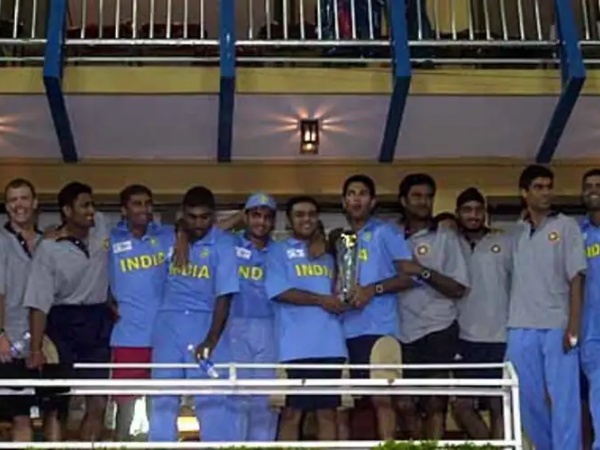views : 872
4 Min Read
What actually happened in the ICC Champions Trophy 2002 final? Check details
The 2002 ICC Champions Trophy final between India and Sri Lanka became one of the most talked-about matches in cricketing history, but for all the wrong reasons, as it ended in a no result despite both teams returning on the reserve day. On the first day, Sri Lanka’s captain, Sanath Jayasuriya, won the toss and chose to bat first. His decision proved to be a sound one, as he played a commanding innings of 74 runs, anchoring the Sri Lankan batting order. Kumar Sangakkara, one of the finest wicketkeepers in cricket history, also played a crucial role, scoring 54 runs to support Jayasuriya. Together, they guided Sri Lanka to a respectable total of 244/5 in their allotted 50 overs, a competitive score on a challenging pitch.
Team India bowled 100 overs in the ICC Champions Trophy 2002 final
However, rain played spoilsport during the match, leading to a disruption in play. Both teams returned on the reserve day, hoping to complete the match and determine a winner. Unfortunately, further rain delays and the resulting damp conditions made it impossible to continue the game, leaving the final without a conclusion. The no result was met with frustration by fans and players alike, as the trophy remained unclaimed. This controversial ending remains one of the most discussed moments in Champions Trophy history, as it deprived the tournament of an outright winner and left a lingering sense of anticlimax.
As Indian openers Dinesh Mongia and Virender Sehwag made their way to the crease, they faced an incredibly short spell of batting, as rain soon interrupted the match. The pair managed to score 14 runs off just two overs before the weather halted play, forcing the game to be pushed to the reserve day. The rain, which showed no signs of relenting, caused a significant delay, ultimately preventing any further progress on the first day. Unlike the modern-day regulations, which allow a game to resume from where it left off after a rain delay, the rules of the time required that the game start afresh on the reserve day.
The next day, with clear skies and no rain in sight, the match was effectively reset, and India once again took the field to bowl at Sri Lanka. Sri Lanka, having won the toss on both days, chose to bat again, and the match restarted with the same conditions as the previous day, despite the passage of time. The unusual circumstances surrounding the final created a sense of frustration for both teams, who had to deal with the uncertainty of the weather, as well as the challenge of starting anew. Despite their best efforts, the rain was a constant threat, and the game would ultimately end without a result, leaving fans disappointed and the tournament lacking its decisive conclusion.
As play resumed on the reserve day, Indian bowlers were once again in top form, with Zaheer Khan delivering a superb performance. The left-arm pacer claimed three wickets for 44 runs, helping India restrict Sri Lanka to a total of 222/7 in their 50 overs. With a powerful batting lineup featuring the likes of Sehwag, Tendulkar, and Mongia, India were well-poised to chase down the target and take control of the game.
However, India faced an early setback when Dinesh Mongia was dismissed for a duck. Despite this, Virender Sehwag and Sachin Tendulkar formed a solid partnership, working to rebuild the innings. Sehwag, in his typical aggressive style, looked confident at the crease, while Tendulkar, as always, was steady and composed. At the time of the rain interruption, Sehwag was unbeaten on 25, while Tendulkar had made 7 runs. India’s score stood at 38/1, with both openers showing promise. Unfortunately, as had been the case the previous day, rain once again disrupted the match. This further added to the frustration of both teams and fans, as the match seemed to be heading towards another uncertain outcome, robbing India of their chance to chase down the target and possibly secure the trophy.
After a long wait and multiple interruptions due to rain, the 2002 Champions Trophy final was eventually called off, and the trophy was shared between India and Sri Lanka. It was a unique and unsatisfying conclusion to the match, as both teams had battled through rain delays and limited play. Over the course of the two days, India managed to bowl 100 overs but had only 10.4 overs of batting, which was far from ideal. Despite their strong bowling efforts, India was unable to chase down Sri Lanka's target, and the game was left with no result.
This final remains notable as the first-ever shared Champions Trophy title between two teams. For India, it marked a significant milestone, though the 2002 edition would remain bittersweet. After a long wait, India went on to claim their first sole Champions Trophy title in 2013 under MS Dhoni, a remarkable achievement just two years after their historic victory in the 2011 ODI World Cup. This 2013 win solidified India’s dominance in international cricket, but the shared 2002 trophy remained a strange chapter in the tournament's history, where both teams had their hands on the coveted prize without an actual winner emerging.
